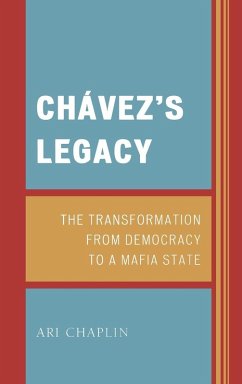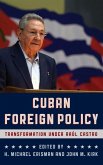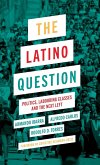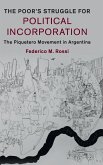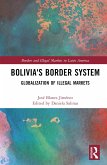- Gebundenes Buch
- Merkliste
- Auf die Merkliste
- Bewerten Bewerten
- Teilen
- Produkt teilen
- Produkterinnerung
- Produkterinnerung
Chavez’s Legacy refutes the claim that Chavez’s regime corrected the errors of Soviet Communism. This book traces Venezuela’s communist transformation and its effects on Bolivia, Ecuador, and Nicaragua. This book also examines Chavez’s behavior in the international arena, strongly emphasizing his close association with Iran and narcotics terrorism.
Andere Kunden interessierten sich auch für
![FOR-GET FOR-GET]() Claudia BucciferroFOR-GET51,99 €
Claudia BucciferroFOR-GET51,99 €![The Hidden Ancestral Identity of the American Negro The Hidden Ancestral Identity of the American Negro]() Radine A America-HarrisonThe Hidden Ancestral Identity of the American Negro22,99 €
Radine A America-HarrisonThe Hidden Ancestral Identity of the American Negro22,99 €![Confrontational 'Us and Them' Dynamics of Polarised Politics in Venezuela Confrontational 'Us and Them' Dynamics of Polarised Politics in Venezuela]() Ybiskay González TorresConfrontational 'Us and Them' Dynamics of Polarised Politics in Venezuela107,99 €
Ybiskay González TorresConfrontational 'Us and Them' Dynamics of Polarised Politics in Venezuela107,99 €![Cuban Foreign Policy Cuban Foreign Policy]() Cuban Foreign Policy107,99 €
Cuban Foreign Policy107,99 €![The Latino Question The Latino Question]() Armando IbarraThe Latino Question104,99 €
Armando IbarraThe Latino Question104,99 €![The Poor's Struggle for Political Incorporation The Poor's Struggle for Political Incorporation]() Federico M. RossiThe Poor's Struggle for Political Incorporation104,99 €
Federico M. RossiThe Poor's Struggle for Political Incorporation104,99 €![Bolivia's Border System Bolivia's Border System]() José Blanes JiménezBolivia's Border System149,99 €
José Blanes JiménezBolivia's Border System149,99 €-
-
-
Chavez’s Legacy refutes the claim that Chavez’s regime corrected the errors of Soviet Communism. This book traces Venezuela’s communist transformation and its effects on Bolivia, Ecuador, and Nicaragua. This book also examines Chavez’s behavior in the international arena, strongly emphasizing his close association with Iran and narcotics terrorism.
Produktdetails
- Produktdetails
- Verlag: University Press of America
- Seitenzahl: 268
- Erscheinungstermin: 26. November 2013
- Englisch
- Abmessung: 235mm x 157mm x 20mm
- Gewicht: 590g
- ISBN-13: 9780761862659
- ISBN-10: 076186265X
- Artikelnr.: 39676026
- Herstellerkennzeichnung
- Libri GmbH
- Europaallee 1
- 36244 Bad Hersfeld
- gpsr@libri.de
- Verlag: University Press of America
- Seitenzahl: 268
- Erscheinungstermin: 26. November 2013
- Englisch
- Abmessung: 235mm x 157mm x 20mm
- Gewicht: 590g
- ISBN-13: 9780761862659
- ISBN-10: 076186265X
- Artikelnr.: 39676026
- Herstellerkennzeichnung
- Libri GmbH
- Europaallee 1
- 36244 Bad Hersfeld
- gpsr@libri.de
Ari Chaplin has taught courses in comparative politics, Latin American history, and terrorism at various colleges in the New York City Metropolitan area. He also served as an educational consultant for the RMC Corporation in New York City. His book Terror: The New Theater of War was published by University Press of America.
Contents
Foreword
Preface
Introduction
Chapter One: What is Bolivarism?
1. Simon Bolivar-A Legend Intended to Legitimize Chávez's Regime
2. The War for People's Minds: Mass Media and Education in Chávez's
Venezuela
3. Is Bolivarism a Totalitarian/Authoritarian Movement?
4. Is Chávez the New Lenin of Latin America?
5. Is Bolivarism Similar to Fascism/Nazism?
6. Civil-Military Relations in Chávez's Venezuela
7. Church-State Relations: The Case of Chávez's Venezuela
8. Comparing Two Models of Political Development: Democratic Versus
Authoritarian
9. The Cubanization of Venezuela
10. External Enemies and the Domestic Sphere
Chapter Two: The Economic Aspects of Chávezism
1. The Ideological Foundations of Chávez's Economic Policies
2. A Critical View of Chávez's Economic Policies
3. Chávez's Oil Policy: The Subordination of Petroleum Activity to
Political and Ideological Considerations
4. Expropriation: A Gradual path to Communism
5. Is Inflation an Integral Part of Socialism?
6. Other Characteristics of Chávez's Economic Policy
7. The Chilean Way (Sebastian Pinera) Versus the Venezuelan Way (Hugo
Chávez)
8. Venezuela and Israel: Transformation from Capitalism to Socialism and
the Reverse
Chapter Three: Chávez's Foreign Policy: Primary Objective-
Expansion of His Ideology
1. Chávez's Views and Behavior in the International System
2. Chávez's First Step in Spreading his Ideology-The Creation
of the Bolivarian Alliance of the People of Our America (ALBA)
3. Beyond ALBA: Chávez's Attempts to Spread His Ideology
Throughout Latin America
4. Chávez's Puppet States: Bolivia, Ecuador, and Nicaragua
5. Venezuela's Chávez and Iran's Cooperation in International Terrorism
6. Chávez and Narcotic-Terrorism
Conclusion: The Transformation from Democracy to Mafia States
Index
Foreword
Preface
Introduction
Chapter One: What is Bolivarism?
1. Simon Bolivar-A Legend Intended to Legitimize Chávez's Regime
2. The War for People's Minds: Mass Media and Education in Chávez's
Venezuela
3. Is Bolivarism a Totalitarian/Authoritarian Movement?
4. Is Chávez the New Lenin of Latin America?
5. Is Bolivarism Similar to Fascism/Nazism?
6. Civil-Military Relations in Chávez's Venezuela
7. Church-State Relations: The Case of Chávez's Venezuela
8. Comparing Two Models of Political Development: Democratic Versus
Authoritarian
9. The Cubanization of Venezuela
10. External Enemies and the Domestic Sphere
Chapter Two: The Economic Aspects of Chávezism
1. The Ideological Foundations of Chávez's Economic Policies
2. A Critical View of Chávez's Economic Policies
3. Chávez's Oil Policy: The Subordination of Petroleum Activity to
Political and Ideological Considerations
4. Expropriation: A Gradual path to Communism
5. Is Inflation an Integral Part of Socialism?
6. Other Characteristics of Chávez's Economic Policy
7. The Chilean Way (Sebastian Pinera) Versus the Venezuelan Way (Hugo
Chávez)
8. Venezuela and Israel: Transformation from Capitalism to Socialism and
the Reverse
Chapter Three: Chávez's Foreign Policy: Primary Objective-
Expansion of His Ideology
1. Chávez's Views and Behavior in the International System
2. Chávez's First Step in Spreading his Ideology-The Creation
of the Bolivarian Alliance of the People of Our America (ALBA)
3. Beyond ALBA: Chávez's Attempts to Spread His Ideology
Throughout Latin America
4. Chávez's Puppet States: Bolivia, Ecuador, and Nicaragua
5. Venezuela's Chávez and Iran's Cooperation in International Terrorism
6. Chávez and Narcotic-Terrorism
Conclusion: The Transformation from Democracy to Mafia States
Index
Contents
Foreword
Preface
Introduction
Chapter One: What is Bolivarism?
1. Simon Bolivar-A Legend Intended to Legitimize Chávez's Regime
2. The War for People's Minds: Mass Media and Education in Chávez's
Venezuela
3. Is Bolivarism a Totalitarian/Authoritarian Movement?
4. Is Chávez the New Lenin of Latin America?
5. Is Bolivarism Similar to Fascism/Nazism?
6. Civil-Military Relations in Chávez's Venezuela
7. Church-State Relations: The Case of Chávez's Venezuela
8. Comparing Two Models of Political Development: Democratic Versus
Authoritarian
9. The Cubanization of Venezuela
10. External Enemies and the Domestic Sphere
Chapter Two: The Economic Aspects of Chávezism
1. The Ideological Foundations of Chávez's Economic Policies
2. A Critical View of Chávez's Economic Policies
3. Chávez's Oil Policy: The Subordination of Petroleum Activity to
Political and Ideological Considerations
4. Expropriation: A Gradual path to Communism
5. Is Inflation an Integral Part of Socialism?
6. Other Characteristics of Chávez's Economic Policy
7. The Chilean Way (Sebastian Pinera) Versus the Venezuelan Way (Hugo
Chávez)
8. Venezuela and Israel: Transformation from Capitalism to Socialism and
the Reverse
Chapter Three: Chávez's Foreign Policy: Primary Objective-
Expansion of His Ideology
1. Chávez's Views and Behavior in the International System
2. Chávez's First Step in Spreading his Ideology-The Creation
of the Bolivarian Alliance of the People of Our America (ALBA)
3. Beyond ALBA: Chávez's Attempts to Spread His Ideology
Throughout Latin America
4. Chávez's Puppet States: Bolivia, Ecuador, and Nicaragua
5. Venezuela's Chávez and Iran's Cooperation in International Terrorism
6. Chávez and Narcotic-Terrorism
Conclusion: The Transformation from Democracy to Mafia States
Index
Foreword
Preface
Introduction
Chapter One: What is Bolivarism?
1. Simon Bolivar-A Legend Intended to Legitimize Chávez's Regime
2. The War for People's Minds: Mass Media and Education in Chávez's
Venezuela
3. Is Bolivarism a Totalitarian/Authoritarian Movement?
4. Is Chávez the New Lenin of Latin America?
5. Is Bolivarism Similar to Fascism/Nazism?
6. Civil-Military Relations in Chávez's Venezuela
7. Church-State Relations: The Case of Chávez's Venezuela
8. Comparing Two Models of Political Development: Democratic Versus
Authoritarian
9. The Cubanization of Venezuela
10. External Enemies and the Domestic Sphere
Chapter Two: The Economic Aspects of Chávezism
1. The Ideological Foundations of Chávez's Economic Policies
2. A Critical View of Chávez's Economic Policies
3. Chávez's Oil Policy: The Subordination of Petroleum Activity to
Political and Ideological Considerations
4. Expropriation: A Gradual path to Communism
5. Is Inflation an Integral Part of Socialism?
6. Other Characteristics of Chávez's Economic Policy
7. The Chilean Way (Sebastian Pinera) Versus the Venezuelan Way (Hugo
Chávez)
8. Venezuela and Israel: Transformation from Capitalism to Socialism and
the Reverse
Chapter Three: Chávez's Foreign Policy: Primary Objective-
Expansion of His Ideology
1. Chávez's Views and Behavior in the International System
2. Chávez's First Step in Spreading his Ideology-The Creation
of the Bolivarian Alliance of the People of Our America (ALBA)
3. Beyond ALBA: Chávez's Attempts to Spread His Ideology
Throughout Latin America
4. Chávez's Puppet States: Bolivia, Ecuador, and Nicaragua
5. Venezuela's Chávez and Iran's Cooperation in International Terrorism
6. Chávez and Narcotic-Terrorism
Conclusion: The Transformation from Democracy to Mafia States
Index

